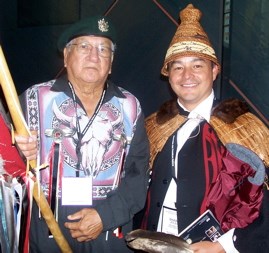NEWS RELEASE
ASSEMBLY OF FIRST NATIONS
************************* Our veterans and the rights-based agenda; closely linked in the Assembly of First Nations elder Art Meawsige and newly elected National Chief Shawn Atleo
SERPENT RIVER FIRST NATION (Monday, July 27, 2009) - Serpent River First Nation had one of its own, elder and veteran Art Meawasige [shown, left, with National Chief Shawn Atleo], carry the community Eagle Staff into the Assembly of First Nations that represents all 633 First Nations across Canada.
The 30th Annual General Assembly (AGA) of the Assembly of First Nations began in the heart of Treaty # 7 in Calgary, Alberta on July 21, 2009.
This was also an election year for the position of national chief.
Five candidates sought this very challenging and deficit-ridden post.
Well-spoken Anishnabek leader and statesman John Beaucage, former grand council chief of the Anishnabek Nation, made a valiant effort to seek support to become the next national leader.
He conceded after having only 15 percent of the voters support subsequent to the second ballot.
It was a stark moment of concession, but in bravery and honor for the “rights-based agenda,” Mr. Beaucage parked his support behind Treaty #4 statesman Perry Bellegarde.
Later on after a 22-hour marathon election, Shawn Atleo would take the helm only after Mr. Bellegarde conceded knowing that an eighth ballot would prove the inevitable.
Serpent River First Nation leadership was quite active in this year’s assembly.
Not only taking part in the historic marathon election process, but Serpent River First Nation Chief Isadore Day, Wiindawtegowinnini also put forward a resolution titled: Truth and Reconciliation; Educating Canada’s public appropriately about the First People’s contribution to the War of 1812 and First People’s Sovereignty as the foundation of Canada’s Constitution 1982.
Chief Day says that this resolution is a key starting point of much work that has to be done towards meeting this historic 2012 bi-centennial year.
“This is very significant part of our First Peoples history with the British Crown and the truth about who is sovereign in this country now known as Canada,” says Day.
With Art Meawasige carrying the community’s Eagle Staff, the chief noted a few points of significance related to the elder’s efforts and the resolution: “We must recognize that our elders and veterans are much more than just symbolic in our relationship with the Crown.”
The chief explains how the formal recognition of First Nation governments is an important element in recognizing the sovereignty shared between Crown governments and original people’s of this land.
“Our ancestors fought not only as comrades along side the British Crown, but as sovereigns, protecting the interests of our respective Nations. This sovereignty was never relinquished and never negotiated away.”
The chief further went on to proudly say, “Genebek, the father of Wiindawtegowinini, who signed the Robinson Huron Treaty of 1850 on behalf of the Anishnabe at Serpent River, joined forces with Chief Shingwauk and other Anishnabe Chiefs in the War of 1812.”
The resolution brought to the Assembly of First Nations is calling on Canada to educate the public on history that clarifies the formal relationship that First Nations have with the Crown and the vital nature of how this sovereignty upholds the “Honor of the Crown” and ultimately Canada’s Constitution,1982.
The chief said that this is a piece of history that is not only important to this region but it also sheds light on why veterans like Art Meawsige are revered so highly in our political assemblies, ceremonies and the powwows.
“Our elder and veteran, Art Meawasige, and others like him, must be commended forever for their beliefs about freedom and nationhood. This is the story that must be told. This is why our men and women dedicated their lives in wartime and peacekeeping efforts: to uphold the honor of First People’s relationship with the Crown.”
Chief Day goes on to say, “Ultimately, all this discussion about Canada’s duty to consult and accommodate, as well as any contemporary discussions of reconciliation of Aboriginal and treaty rights, will have to be spoken about from a place of truth by governments if Canada wants to continue to be looked upon as a global humanitarian. To do otherwise will erode the integrity of Canada and its constitutionality; it is time for change.”
*************************
